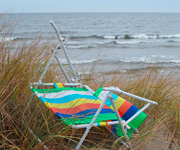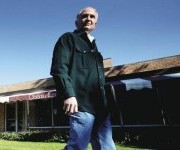David Orr.Photo: Lisa DeJongThis story is the second of two pieces excerpted from a feature story in the Chronicle of Higher Education. Read the first piece here, and the full Chronicle story here.
Environmental studies professor David Orr has set out to turn the aging rust belt town of Oberlin, Ohio, into a laboratory for sustainability. In the process, he has drawn interest from unlikely places: Experts from the military and in national security see the Oberlin Project as a compelling plan to focus on vulnerabilities in the nation’s food, energy, and socioeconomic systems. They and others, including leaders of the New America Foundation, a nonpartisan Washington research group, see it as a model that communities across the country could follow.
One of Orr’s most vocal advocates is Col. Mark “Puck” Mykleby of the U.S. Marines, who just retired as special strategic assistant to the chairman of the Joint Chiefs of Staff. Over the summer, Mykleby received national attention for a paper he wrote with another military strategist, Capt. Wayne Porter of the Navy, which argued that America’s future lay not with its robust military force but with strategies for sustainable energy and agriculture, fair social policies, and a strong educational system.
Earlier this year, Mykleby and Orr were in Washington, D.C., meeting with agencies, think tanks, and foundations, and the professor and the wiry Marine made an unusual couple. But as they sat together in the bar of a stylish hotel on F Street, it made sense — especially as Mykleby started talking about the power of campus communities and his doubts that solutions would flow out of the nation’s capital.
“The structures here, the organizations here, are all about trying to control the uncontrollable and about placating Americans,” Mykleby said, his voice rising with frustration. “We need to have an adult conversation with Americans about the problem: We have a lot of work to do, and we better stare it straight in the eye and frickin’ get it on.”
Mark Mykleby.Photo: Kris Krüg for PopTechWhen the Oberlin Project was just getting started, Orr invited city council members to sit down with Mykleby at the Feve, Oberlin’s watering hole, for a kind of scared-straight session. Decked out in his military ribbons, the military strategist talked about the country’s vulnerabilities to so-called black-swan events, unanticipated threats from outside and in.
In some ways, the Oberlin Project resembles the Transition Towns of England — a new movement to relocalize food production, goods, and services (and even create local currencies) in response to worries about “peak oil” — the inevitable decline in oil supplies — and the breakdowns in social, economic, and other systems that peak oil will entail. Richard Heinberg, a journalist who has written several sobering books about peak oil, depleting resources, and, most recently, the flaccid economy, sees the Oberlin Project as “the most important thing we could be doing right now.”
“David has painted the project in glowing, positive terms — as something inviting, as something preferable to what we have now,” Heinberg says. “But from my perspective, it’s an insurance policy against the economic contraction that we are likely to see in future years.”
Patrick C. Doherty, a national-security expert at the New America Foundation, doesn’t consider himself a “doomer,” a label applied to Heinberg and some of his colleagues. But he does think the nation needs a new way of organizing itself. He is working with Orr and Mykleby on a “national sustainable communities coalition” that will attempt to replicate the Oberlin Project in other parts of the country — possibly around military bases that are striving for sustainability.
In the 20th century, says Doherty, the United States coordinated its political and economic power to meet great global challenges, in what was called “grand strategy.” We did it in World War II in orienting the nation’s industrial base to ramp up and outperform the Axis powers. And we did it again in economically and politically outperforming and outlasting the Soviets in the cold war.
Patrick Doherty.Photo: New America FoundationDoherty and his colleagues believe that the nation needs grand strategy once again to meet a new global challenge. “We think that the core global challenge is global unsustainability,” he says — a convergence of major problems, including a persistent middle-class recession, ecological systems in decline, a vast population of the world’s poorest people cut out of the global economy, and a core infrastructure susceptible to shock and disruption.
Part of the nation’s grand strategy in the cold war was to build suburbia, to satisfy a major housing demand and stoke the economic engine. But those suburban communities are now both unsustainable and undesirable, Doherty says. Research shows that the majority of both retiring baby boomers and up-and-coming millennials want to live in walkable, affordable communities, rich with amenities and connected to mass transit.
In short, it’s called “smart growth” — and it’s the way many college towns are already designed and oriented. In fact, Doherty points out, college towns (including, even recently, Oberlin) have been the sites of new retirement communities, because that older generation wants to live close to institutions of higher education and the cultures they foster.
Top-down policy can drive this new grand strategy, he says, but given the political climate and the doubts people have about the effectiveness of government, it may have to start with small efforts like the Oberlin Project. Either way, he says, higher-education institutions would be “essential” to pulling it off.
The Rust Belt, Orr believes, is an ideal laboratory for this experiment. It has an abundance of resources that will be even more valuable in the future, including water and prime farmland. “It’s not going to have to get a whole lot hotter in Texas before we see Texans coming up here,” Orr says.
And institutions of higher learning should lead the charge, he believes. “What colleges and universities can do, it seems to me, is serve as genuine anchor institutions,” Orr says. “Intellectual leadership is going to be really important for moving forward in an era that is going to be radically different.”



